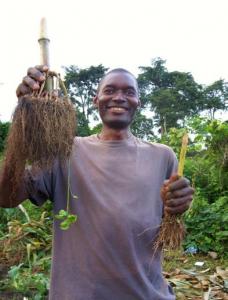Cameroon trial data show strong improvement in maize yield
- Log in to post comments
Biochar Fund, Kumba, Cameroon
Septemer, 2009
Since December 2008, more than 1500 subsistence farmers in Cameroon's South-West Region (SWR) have been participating in the largest-ever field trial testing the effects of biochar on crop productivity. The first results of this ongoing experiment, based on maize planted in a large series of plots, are now available. The data can be described as 'remarkable', in that they demonstrate how biochar consistently helps to boost crop productivity in tropical soils, sometimes in a spectacular manner.
The preliminary results suggest that biochar may offer a solution to hunger and food insecurity amongst the world's poorest, as well as to soil depletion and tropical deforestation.
Data Page with Current Results
Project Photo Pages with Participant and Plant Photos
See the Biochar Fund Report Page for an the Full Report, and continuing updates
(some of which is copied below for your convenience).
The Cameroonian farmers are united in 'Common Interest Groups' (CIGs), comprising between 10 and 30 members each. CIGs are the most grassroot of all forms of association in the country. These associations voluntarily dedicated a small plot of their (often scarce) farm land to conduct the experiment.
The participants are subsistence farmers who make less than Adidas shoes | Nike Shoes

